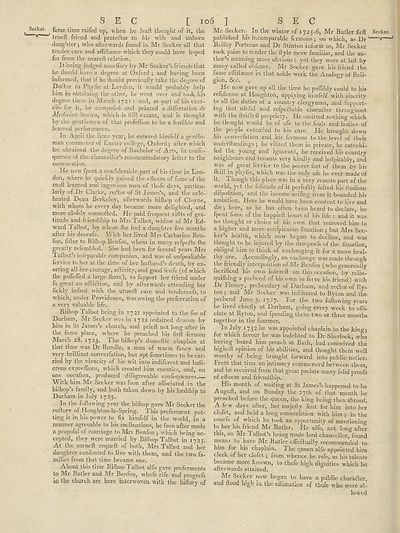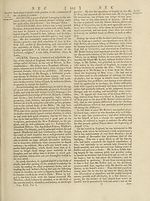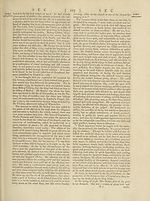Encyclopaedia Britannica, or, a Dictionary of arts, sciences, and miscellaneous literature : enlarged and improved. Illustrated with nearly six hundred engravings > Volume 19, Scripture-SUG
(116) Page 106
Download files
Complete book:
Individual page:
Thumbnail gallery: Grid view | List view

SEC [ 106 ] SEC
Seeker, . fame time raifed up, when he leaft thought of it, the
truefl: friend and protestor to his wife and unborn
daughter j who afterwards found in Mr Seeker all that
tender care and affiflance which they could have hoped
for from the neareft relation.
It being judged neceflaryby Mr Seeker’s friends that
he ihould have a degree at Oxford ; and having been
informed, that if he ihould previoufly take the degree of
Dottor in Phyfic at Leyden, it would probably help
him in obtaining the other, he went over and took his
degree there in March 1721 : and, as part of his exer-
cife lor it, he compofed and printed a diflertation de
Medicma Statica, which is ftill extant, and is thought
by the gentlemen of that profeffion to be a fenfibie and
learned performance.
In April the fame year, he entered himfelf a gentle¬
man commoner of Exeter college, Oxford; after which
he obtained the degree of Bachelor of Arts, in confe-
quence of the chancellor’s recommendatory letter to the
convocation.
He now fpent a confiderable part of his time in Lon¬
don, where he quickly gained the efteem of feme of the
moft learned and ingenious men of thofe days, particu¬
larly of Dr Clarke, rector of St James’s, and the cele¬
brated Dean Berkeley, afterwards bilhop of Cloyne,
with whom he every day became more delighted/and
more clofely connected. He paid frequent vifits of gra¬
titude and fi iendlhip to Mrs Talbot, widow of Mr Ed¬
ward I albot, by whom (he had a daughter five months
after his deceafe. With her lived Mrs Catharine Ben-
fon, filler to Bilhop Benfon, whom in many refpetfts fhe
greatly refembled. She had been for feveral years Mrs
1 albot’s inleparable companion, and was of unfpeakable
fervice to her at the time of her hulhand’s death, by ex¬
erting all her courage, a&ivity, and good fenfe (of which
Ihe pofleffed a large (hare), to fupport her friend under
fo great an affliction, and by afterwards attending her
fickly infant with the utmoft care and tendernefs, to
which, under Providence, was owing the prefervation of
a very valuable life.
Bilhop Talbot being in 1721 appointed to the fee of
Durham, Mr Seeker was in 1722 ordained deacon by
him in St James’s church, and prielt not long after in
the fame place, where he preached his firlt fermon
March 28. 1723. The bilhop’s domeftic chaplain at
that time was Dr Bundle, a man of warm fancy and
very brilliant converfation, but apt fometimes to be car¬
ried by the vivacity of his wit into indifereet and ludi¬
crous expreffions, which created him enemies, and, on
one oecafion, produced difagreeable confequences.
With him Mr Seeker was foon after affociated in the
bilhop’s family, and both taken down by his lordihip to
Durham in July 1723.
In the following year the bilhop gave Mr Seeker the
redlory of Houghton-le-Spring. This preferment put¬
ting it in his power to fix himfelf in the world, in a
manner agreeable to his inclinations, he foon after made
a propofal of marriage to Mrs Benfon ; which being ac¬
cepted, they were married by Bilhop Talbot in 1725.
At the earneft requeft of both, Mrs Talbot and her
daughter confented to live with them, and the two fa¬
milies from that time became one.
About this time Bilhop Talbot alfo gave preferments
to Mr Butler and Mr Benfon, whofe rife and progrefs
io the church are here interwoven with the hiftory of
Mr Seeker.. In the winter of 1725-6, Mr Butler firft Seeker.
publilhed his incomparable ft rmons ; on which, as Dr ' "v—
Beilby Porteous and Dr Stinton inform us, Mr Seeker
took pains to render the llyle more familiar, and the au¬
thor’s meaning more obvious : yet they were at laid by
many called obfeure. Mr Seeker gave his friend the
fame affifiance in that noble work the Analogy of Reli¬
gion, &.C.
He now gave up all the time he poffibly could to his
refidence at Houghton, applying himfelf with alacrity
to all the duties of a country clergyman, and fupport-
ing that ufeful and refpedlable character throughout*
with the firicleft propriety. He omitted nothing which
he thought Would be of ufe to the fouls and bodies of
the people entrulled to his care. Tie brought down
his converfation and his fermons to the level of their
underftandings ; he vifited them in private, he catechi-
fed the young and ignorant, he received his country
neighbours and tenants very kindly and holpitably, and
was of great lervice to the poorer fort of them by his
Ikiil in phylic, which was the only ufe he ever made of
it. 1 hough this place was in a very remote part of the
world, yet the folitude of it perfectly fuited his fiudious
difpofition, and the income arifing from it bounded his
ambition. Here he would have been content to live and
die; here, as he has otten been heard to declare, he
fpent fume of the happieft hours of his life : and it was
no thought or choice of his own that removed him to
a higher and more confpicuous fituation ; but Mrs See¬
ker’s health, which now began to decline, and was
thought to be injured by the dampnefs of the lituation,
obliged him to think of exchanging it for a more heal¬
thy one. Accordingly, an exchange rvas made through
the friendly interpolition of Mr Benfon (who generoully
facrificed his ow n intereft on this occafion, by relin-
quifiling a prebend of his own to ferve his friend) with
Dr Finney, prebendary of Durham, and re&or of By-
ton ; and Mr Seeker was infiituted to Ryton and the
prebend 10063.1727. For the two following years
he lived chiefiy at Durham, going every week "to offi¬
ciate at Ryton, and fpending there two or three months
together in the fummer.
In July 1732 be was appointed chaplain to the king;
for which favour he was indebted to Dr Sherlock, who
having heard him preach at Bath, had conceived the
higheft opinion of his abilities, and thought them well
worthy of being brought forward into public notice.
From that time an intimacy commenced between them
and he received from that great prelate many folid proofs
of efteem and friendfhip.
His month of waiting at St James’s happened to be
Auguft, and on Sunday the 27th of that month he
preached before the queen, the king being then abroad.
A few days after, her majefty fent for him into her
clofet, and held a long converfation with him ; in the
courfe of which he took an opportunity of mentioning
to her his friend Mr Butler. He alfo, not long after
this, on Mr T albot’s being made lord chancellor, found
means to have Mr Butler effectually recommended to
him for his chaplain. Ihe queen alfo appointed him
clerk of her clofet ; from vfflence he rofe, as his talents
became more known, to thofe high dignities which he
afterwards attained.
Mr Seeker now began to have a public character,
and ftood high in the effimation of thoie who were al¬
lowed
Seeker, . fame time raifed up, when he leaft thought of it, the
truefl: friend and protestor to his wife and unborn
daughter j who afterwards found in Mr Seeker all that
tender care and affiflance which they could have hoped
for from the neareft relation.
It being judged neceflaryby Mr Seeker’s friends that
he ihould have a degree at Oxford ; and having been
informed, that if he ihould previoufly take the degree of
Dottor in Phyfic at Leyden, it would probably help
him in obtaining the other, he went over and took his
degree there in March 1721 : and, as part of his exer-
cife lor it, he compofed and printed a diflertation de
Medicma Statica, which is ftill extant, and is thought
by the gentlemen of that profeffion to be a fenfibie and
learned performance.
In April the fame year, he entered himfelf a gentle¬
man commoner of Exeter college, Oxford; after which
he obtained the degree of Bachelor of Arts, in confe-
quence of the chancellor’s recommendatory letter to the
convocation.
He now fpent a confiderable part of his time in Lon¬
don, where he quickly gained the efteem of feme of the
moft learned and ingenious men of thofe days, particu¬
larly of Dr Clarke, rector of St James’s, and the cele¬
brated Dean Berkeley, afterwards bilhop of Cloyne,
with whom he every day became more delighted/and
more clofely connected. He paid frequent vifits of gra¬
titude and fi iendlhip to Mrs Talbot, widow of Mr Ed¬
ward I albot, by whom (he had a daughter five months
after his deceafe. With her lived Mrs Catharine Ben-
fon, filler to Bilhop Benfon, whom in many refpetfts fhe
greatly refembled. She had been for feveral years Mrs
1 albot’s inleparable companion, and was of unfpeakable
fervice to her at the time of her hulhand’s death, by ex¬
erting all her courage, a&ivity, and good fenfe (of which
Ihe pofleffed a large (hare), to fupport her friend under
fo great an affliction, and by afterwards attending her
fickly infant with the utmoft care and tendernefs, to
which, under Providence, was owing the prefervation of
a very valuable life.
Bilhop Talbot being in 1721 appointed to the fee of
Durham, Mr Seeker was in 1722 ordained deacon by
him in St James’s church, and prielt not long after in
the fame place, where he preached his firlt fermon
March 28. 1723. The bilhop’s domeftic chaplain at
that time was Dr Bundle, a man of warm fancy and
very brilliant converfation, but apt fometimes to be car¬
ried by the vivacity of his wit into indifereet and ludi¬
crous expreffions, which created him enemies, and, on
one oecafion, produced difagreeable confequences.
With him Mr Seeker was foon after affociated in the
bilhop’s family, and both taken down by his lordihip to
Durham in July 1723.
In the following year the bilhop gave Mr Seeker the
redlory of Houghton-le-Spring. This preferment put¬
ting it in his power to fix himfelf in the world, in a
manner agreeable to his inclinations, he foon after made
a propofal of marriage to Mrs Benfon ; which being ac¬
cepted, they were married by Bilhop Talbot in 1725.
At the earneft requeft of both, Mrs Talbot and her
daughter confented to live with them, and the two fa¬
milies from that time became one.
About this time Bilhop Talbot alfo gave preferments
to Mr Butler and Mr Benfon, whofe rife and progrefs
io the church are here interwoven with the hiftory of
Mr Seeker.. In the winter of 1725-6, Mr Butler firft Seeker.
publilhed his incomparable ft rmons ; on which, as Dr ' "v—
Beilby Porteous and Dr Stinton inform us, Mr Seeker
took pains to render the llyle more familiar, and the au¬
thor’s meaning more obvious : yet they were at laid by
many called obfeure. Mr Seeker gave his friend the
fame affifiance in that noble work the Analogy of Reli¬
gion, &.C.
He now gave up all the time he poffibly could to his
refidence at Houghton, applying himfelf with alacrity
to all the duties of a country clergyman, and fupport-
ing that ufeful and refpedlable character throughout*
with the firicleft propriety. He omitted nothing which
he thought Would be of ufe to the fouls and bodies of
the people entrulled to his care. Tie brought down
his converfation and his fermons to the level of their
underftandings ; he vifited them in private, he catechi-
fed the young and ignorant, he received his country
neighbours and tenants very kindly and holpitably, and
was of great lervice to the poorer fort of them by his
Ikiil in phylic, which was the only ufe he ever made of
it. 1 hough this place was in a very remote part of the
world, yet the folitude of it perfectly fuited his fiudious
difpofition, and the income arifing from it bounded his
ambition. Here he would have been content to live and
die; here, as he has otten been heard to declare, he
fpent fume of the happieft hours of his life : and it was
no thought or choice of his own that removed him to
a higher and more confpicuous fituation ; but Mrs See¬
ker’s health, which now began to decline, and was
thought to be injured by the dampnefs of the lituation,
obliged him to think of exchanging it for a more heal¬
thy one. Accordingly, an exchange rvas made through
the friendly interpolition of Mr Benfon (who generoully
facrificed his ow n intereft on this occafion, by relin-
quifiling a prebend of his own to ferve his friend) with
Dr Finney, prebendary of Durham, and re&or of By-
ton ; and Mr Seeker was infiituted to Ryton and the
prebend 10063.1727. For the two following years
he lived chiefiy at Durham, going every week "to offi¬
ciate at Ryton, and fpending there two or three months
together in the fummer.
In July 1732 be was appointed chaplain to the king;
for which favour he was indebted to Dr Sherlock, who
having heard him preach at Bath, had conceived the
higheft opinion of his abilities, and thought them well
worthy of being brought forward into public notice.
From that time an intimacy commenced between them
and he received from that great prelate many folid proofs
of efteem and friendfhip.
His month of waiting at St James’s happened to be
Auguft, and on Sunday the 27th of that month he
preached before the queen, the king being then abroad.
A few days after, her majefty fent for him into her
clofet, and held a long converfation with him ; in the
courfe of which he took an opportunity of mentioning
to her his friend Mr Butler. He alfo, not long after
this, on Mr T albot’s being made lord chancellor, found
means to have Mr Butler effectually recommended to
him for his chaplain. Ihe queen alfo appointed him
clerk of her clofet ; from vfflence he rofe, as his talents
became more known, to thofe high dignities which he
afterwards attained.
Mr Seeker now began to have a public character,
and ftood high in the effimation of thoie who were al¬
lowed
Set display mode to:
![]() Universal Viewer |
Universal Viewer | ![]() Mirador |
Large image | Transcription
Mirador |
Large image | Transcription
Images and transcriptions on this page, including medium image downloads, may be used under the Creative Commons Attribution 4.0 International Licence unless otherwise stated. ![]()
| Permanent URL | https://digital.nls.uk/192696790 |
|---|
| Attribution and copyright: |
|
|---|
| Description | Ten editions of 'Encyclopaedia Britannica', issued from 1768-1903, in 231 volumes. Originally issued in 100 weekly parts (3 volumes) between 1768 and 1771 by publishers: Colin Macfarquhar and Andrew Bell (Edinburgh); editor: William Smellie: engraver: Andrew Bell. Expanded editions in the 19th century featured more volumes and contributions from leading experts in their fields. Managed and published in Edinburgh up to the 9th edition (25 volumes, from 1875-1889); the 10th edition (1902-1903) re-issued the 9th edition, with 11 supplementary volumes. |
|---|---|
| Additional NLS resources: |
|

